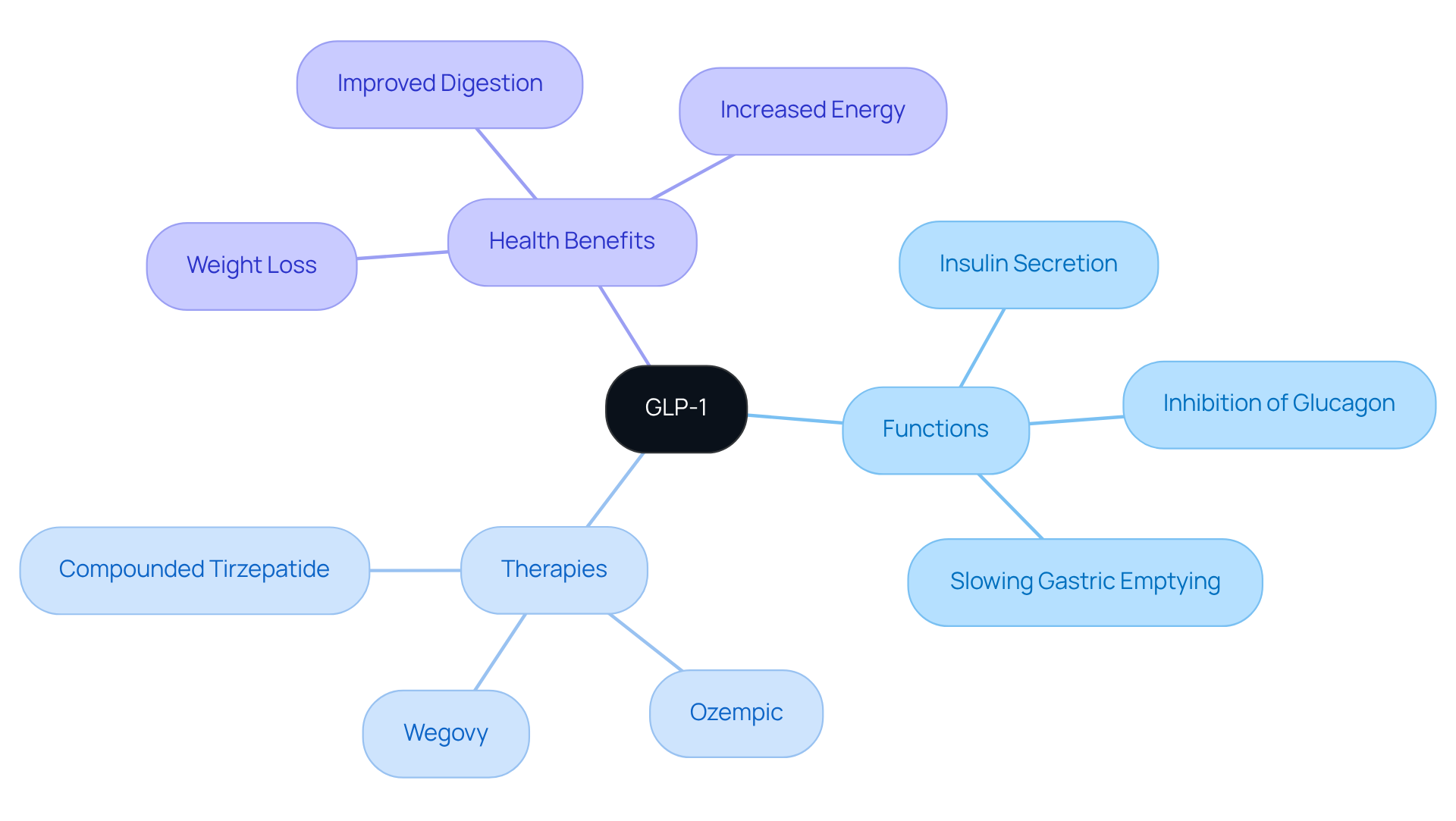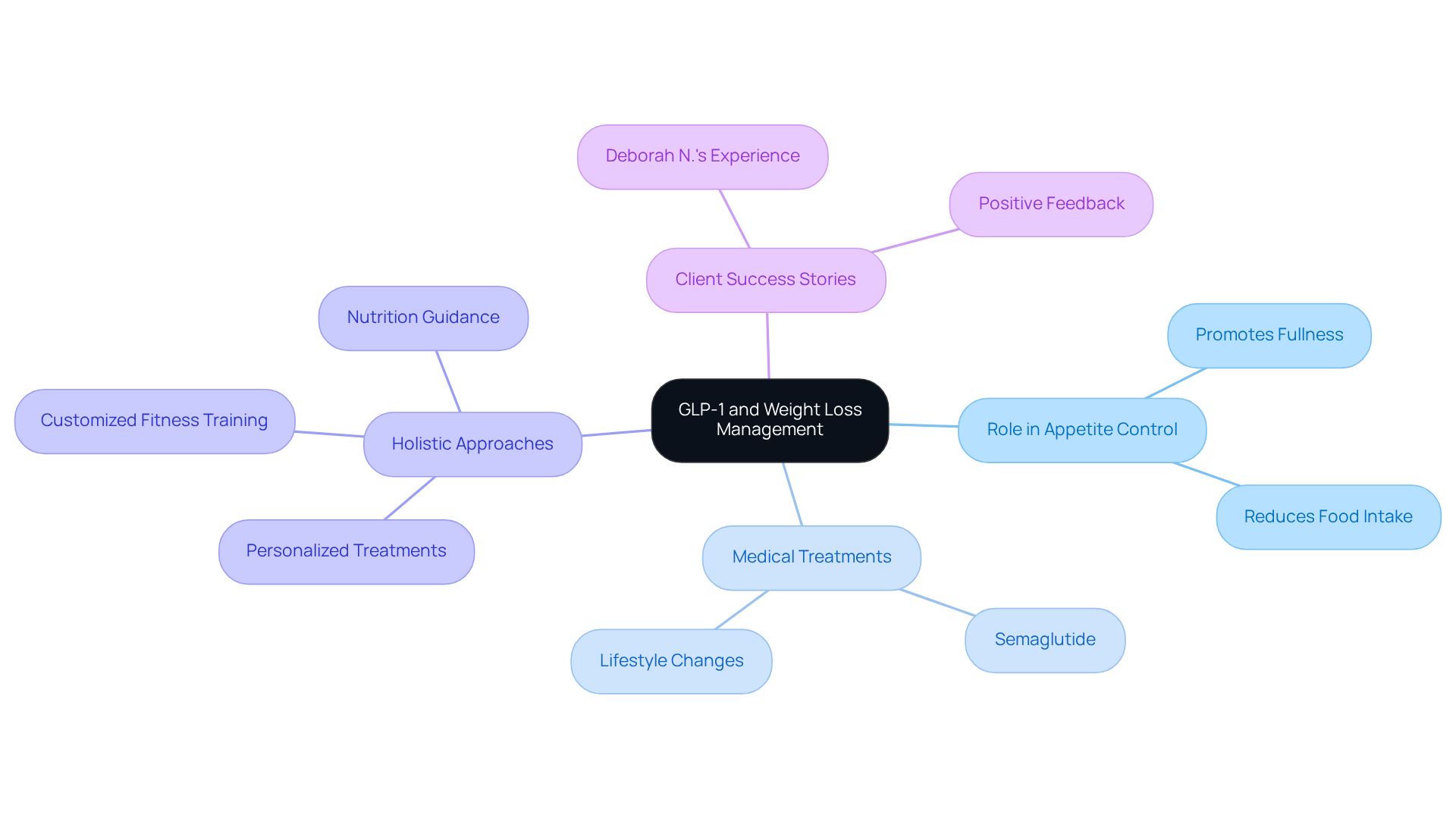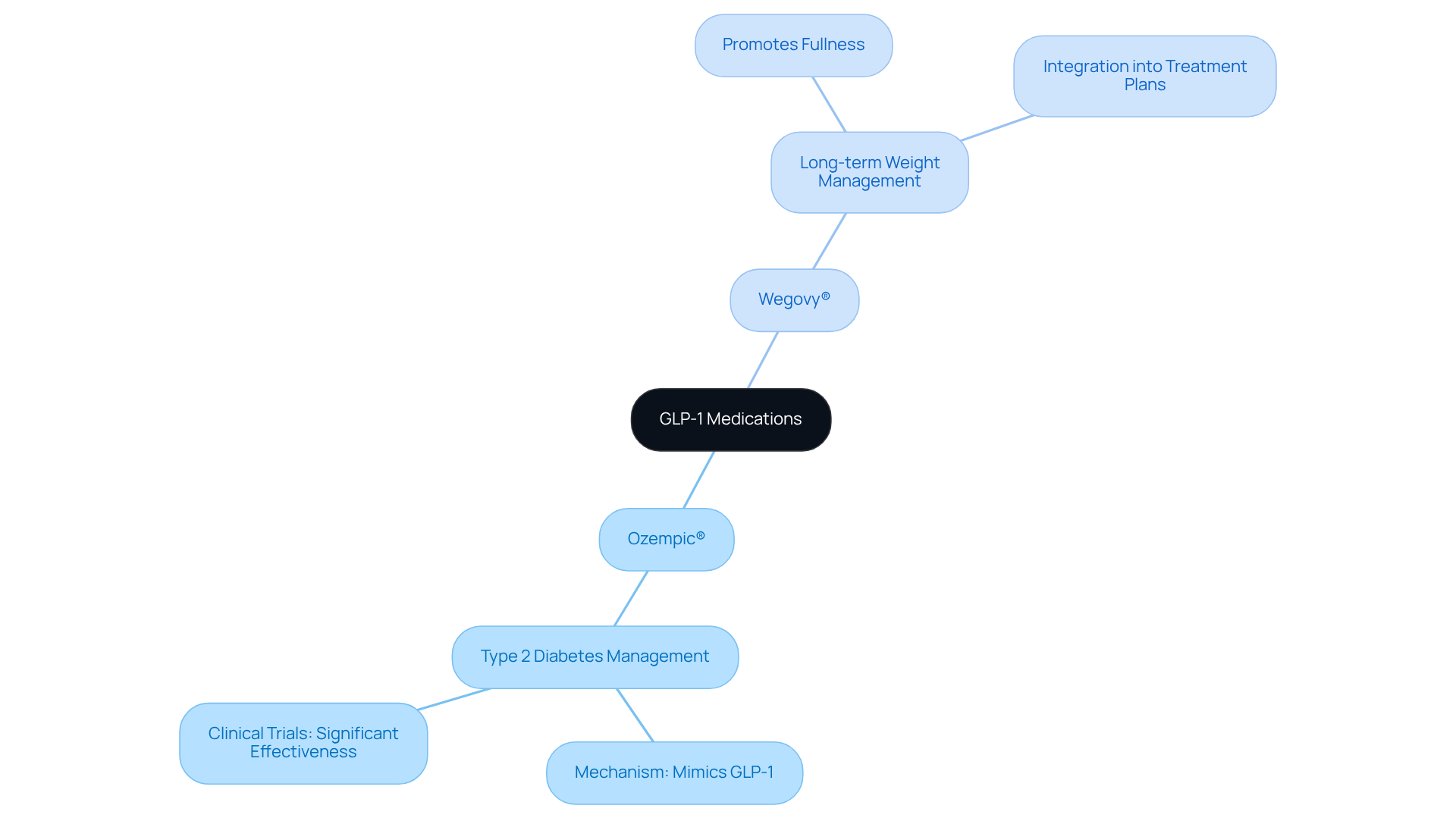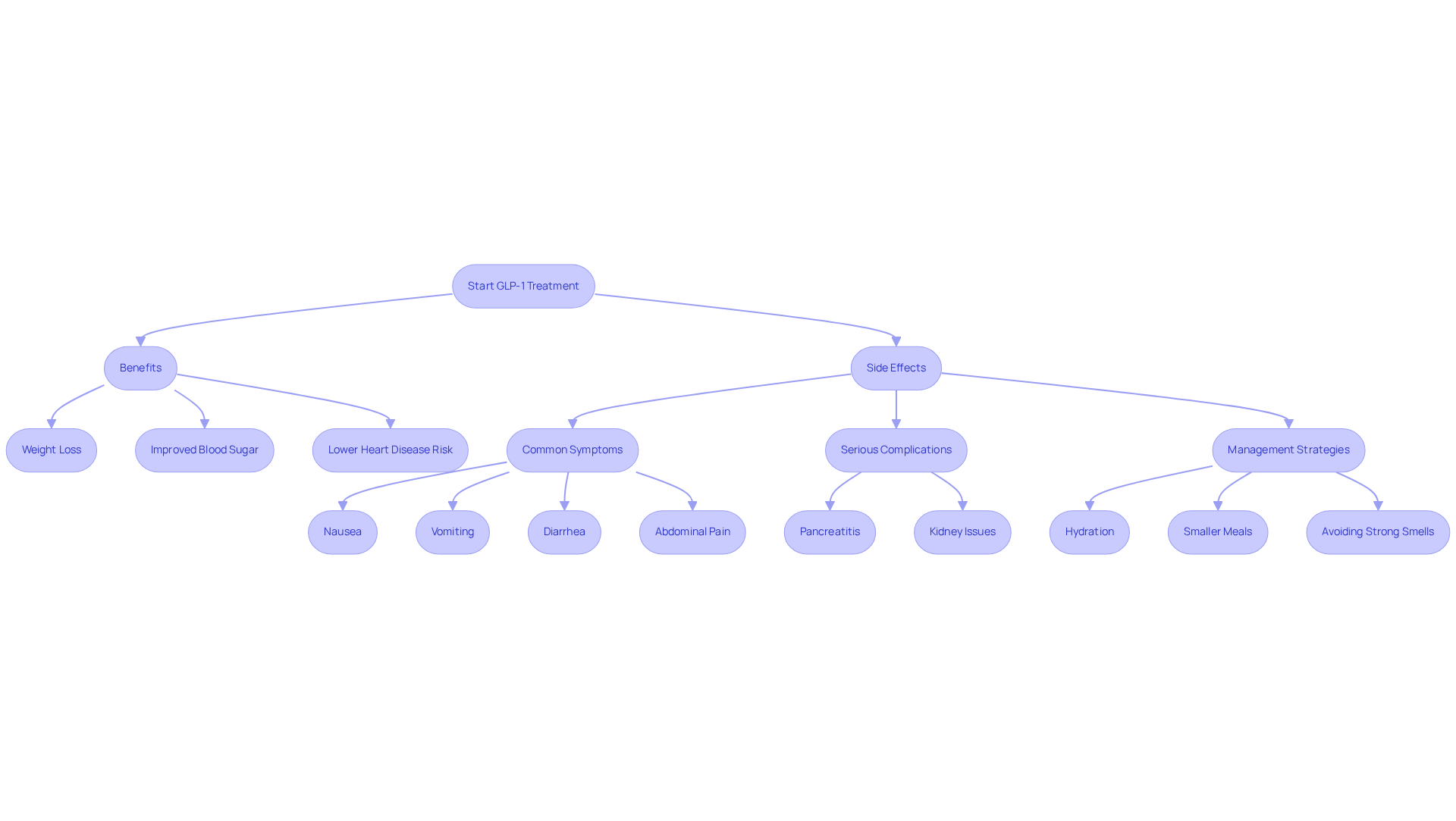Overview
GLP-1, or Glucagon-Like Peptide-1, is an incretin hormone that plays a crucial role in your weight loss journey. It enhances insulin sensitivity, promotes a sense of fullness, and helps regulate blood sugar levels. If you’ve been feeling overwhelmed by your struggles with weight, know that you’re not alone. This hormone is significant in managing obesity through therapies like Ozempic and Wegovy. These options have shown substantial weight loss results and additional health benefits.
Imagine feeling more in control of your health and well-being. GLP-1’s potential as a vital tool in combating obesity and related metabolic disorders is truly remarkable. As you explore these therapies, remember that together, we can achieve your goals. You deserve to feel empowered and supported in this journey. Take a moment to reflect on how these advancements can make a difference in your life.
Introduction
Glucagon-Like Peptide-1 (GLP-1) has emerged as a pivotal player in weight management and metabolic health, capturing attention for its remarkable ability to regulate appetite and enhance insulin sensitivity. As many individuals face the challenges of obesity, it’s important to understand how GLP-1 can open new pathways to effective weight loss solutions.
Yet, with the promise of significant weight reduction, we must also navigate potential side effects and treatment complexities.
How can we harness the benefits of GLP-1 therapies while minimizing risks? What does this mean for the future of effective obesity management? Together, we can explore these questions and find a supportive path forward.
Define GLP-1: Understanding Its Function and Mechanism
Glucagon-Like Peptide-1, a vital incretin hormone, is produced in your intestines in response to the food you eat. It plays a key role in your health by stimulating insulin secretion, inhibiting glucagon release, and slowing gastric emptying. By enhancing insulin sensitivity and promoting a sense of fullness, this hormone is essential for regulating blood sugar levels and appetite. Understanding what is GLP-1 is crucial, especially in conversations about fat reduction and managing obesity.
Recent studies have revealed exciting potential in managing body mass with GLP-1 therapies, including:
- Compounded Tirzepatide
- Ozempic
- Wegovy
Many individuals have experienced significant weight loss—averaging 15-20% of their body mass within a year. Compounded Tirzepatide, in particular, offers a personalized approach to reducing body mass, tailored to your unique health journey. These therapies not only assist in achieving and maintaining weight loss but also come with additional health benefits, such as improved digestion and increased energy levels.
For instance, the FLOW trial showed a remarkable 24% decrease in kidney-related issues among type 2 diabetes patients treated with semaglutide. This highlights the broader health advantages that extend beyond just fat reduction. Moreover, ongoing research is exploring how this medication can help with conditions like obstructive sleep apnea, with promising results showing reductions in apnea incidents alongside weight loss.
These findings underscore the significance of GLP-1, or what is GLP-1, in managing appetite and blood sugar levels, positioning it as a vital ally in the fight against obesity and related metabolic disorders. If you’re ready to embark on your personalized health journey, we invite you to explore our offerings, starting at just $99.99 per month. Together, we can achieve your goals and support your path to wellness.
Contextualize GLP-1: Its Role in Weight Loss and Obesity Management
This hormone has become increasingly important in managing weight loss, as it helps promote a sense of fullness and reduce food intake. Many individuals facing obesity often find that their bodies struggle with the signaling of this hormone, which can lead to overeating and weight gain. By making lifestyle changes or seeking medical treatments, you can improve how this hormone functions, leading to better management of your weight.
Understanding what is GLP one and its role in appetite control and blood sugar regulation highlights its significance in obesity treatments. This aligns beautifully with the holistic approach embraced by companies like Minimal. Their comprehensive program focuses on helping you achieve a healthier body through personalized treatments, such as Semaglutide, customized fitness training, and nutrition guidance. These resources empower you to develop sustainable health habits that fit your lifestyle.
Positive feedback from clients, like Deborah N., illustrates the success of these tailored health solutions. Her experience showcases how these programs contribute to improved fitness and overall well-being. Remember, you’re not alone on this journey; together, we can achieve your goals and foster a healthier, happier you.
Explore GLP-1 Medications: Types and Their Specific Uses
Many individuals are seeking effective solutions for their weight loss journey, and numerous receptor agonists are now available for clinical application, including medications like Ozempic® and Wegovy®. These treatments mimic the effects of natural GLP-1, which leads to the inquiry of what is GLP-1, helping to promote weight loss by enhancing feelings of fullness and reducing caloric intake. While Ozempic® is primarily used for managing type 2 diabetes, Wegovy® is specifically approved for the long-term management of body composition.
Both of these medications have shown significant effectiveness in clinical trials, with many patients experiencing substantial weight loss when combined with lifestyle changes. It’s important to remember that you are not alone in this journey; many have found success and support through these options. The integration of these medications into personalized treatment plans is a vital aspect of the services offered by health and wellness companies like Minimal. Together, we can achieve your goals and navigate this path with understanding and care.
Assess Side Effects and Challenges: Navigating GLP-1 Treatment
Wegovy and similar medications can be very effective for weight loss, often leading to individuals losing about 10% of their body weight. Beyond this, they offer additional benefits such as improved blood sugar management and a lower risk of heart disease. However, it’s important to recognize that these medications can also present a range of side effects. Have you experienced nausea, vomiting, diarrhea, or abdominal pain during the initial stages of treatment? These symptoms are common and typically lessen as your body adjusts to the medication.
While most side effects are manageable, some patients may face more serious complications like pancreatitis and kidney issues. Statistics show that gastrointestinal symptoms are prevalent, especially in the early phases of therapy. It’s essential for anyone considering this treatment to engage in thorough discussions with their healthcare providers. Together, you can weigh the benefits against the possible risks. Regular monitoring and support are vital in navigating these challenges effectively.
For instance, you might find relief by staying hydrated, eating smaller meals, and avoiding strong smells, which can help mitigate nausea and vomiting. Additionally, healthcare professionals emphasize the importance of lifestyle modifications alongside medication to enhance treatment outcomes. Remember, Wegovy is administered via a subcutaneous injection once a week, using a pre-filled pen for your convenience.
By fostering open communication and providing tailored support, companies like Minimal empower you to understand what is GLP-1 treatment and navigate its complexities successfully. Together, we can achieve your goals and help you on your weight loss journey.
Conclusion
Understanding GLP-1 and its critical role in weight management can truly illuminate how this incretin hormone may serve as a game-changer in the fight against obesity. By regulating appetite and enhancing insulin sensitivity, GLP-1 not only supports significant weight loss but also contributes to broader health improvements. This makes it an essential focus in obesity treatments.
The article highlights the impressive efficacy of GLP-1 therapies, such as Ozempic and Wegovy. These treatments have shown substantial weight loss results, especially when combined with lifestyle modifications. Additionally, they provide significant health benefits, including:
- Improved blood sugar control
- Reduced risks of associated conditions like heart disease
Ongoing research continues to expand our understanding of GLP-1’s applications, emphasizing its importance in both weight loss and overall health management.
As the landscape of obesity treatment evolves, embracing the potential of GLP-1 medications offers hope to many seeking to improve their health. Engaging with healthcare professionals and exploring personalized treatment plans can empower individuals on their weight loss journeys. By understanding the mechanisms and benefits of GLP-1, a proactive approach to health and wellness becomes attainable. Together, we can pave the way for a healthier future.
Frequently Asked Questions
What is GLP-1 and what role does it play in the body?
GLP-1, or Glucagon-Like Peptide-1, is an incretin hormone produced in the intestines in response to food intake. It stimulates insulin secretion, inhibits glucagon release, and slows gastric emptying, thereby regulating blood sugar levels and appetite.
How does GLP-1 contribute to weight management?
GLP-1 therapies, such as compounded Tirzepatide, Ozempic, and Wegovy, have shown potential for significant weight loss, averaging 15-20% of body mass within a year. These therapies enhance insulin sensitivity and promote a sense of fullness, aiding in managing body weight.
What are some health benefits associated with GLP-1 therapies?
In addition to weight loss, GLP-1 therapies can improve digestion and increase energy levels. For example, the FLOW trial indicated a 24% decrease in kidney-related issues among type 2 diabetes patients treated with semaglutide.
Are there any ongoing studies related to GLP-1?
Yes, ongoing research is exploring the potential of GLP-1 medications in treating conditions such as obstructive sleep apnea, with promising results showing reductions in apnea incidents alongside weight loss.
How can someone start using GLP-1 therapies for weight management?
Individuals interested in GLP-1 therapies can explore personalized health offerings starting at $99.99 per month, which can support their weight management and wellness journey.





















